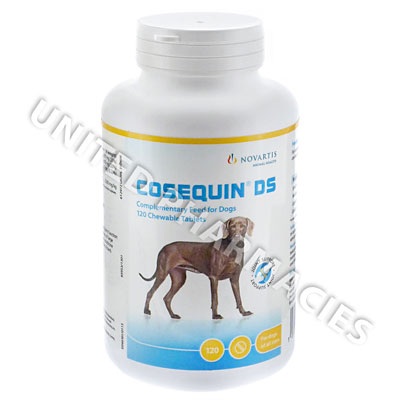Customers also like
Carproheal (Carprofen) - 50mg (10 Tablets)
our best price : $7.56
Carodyl (Carprofen) - 100mg (60 Chewable Tablets)
our best price : $48.51
Aquadent Drinking Water Additive For Dogs and Cats (Xylitol) - 250mL
our best price : $46.42
Rimadyl (Carprofen) - 100mg (100 Tablets)
our best price : $219.04
Denosyl (S-Adenosylmethionine) - 225mg (30 Tablets)
our best price : $89.15
ProMotion for Med/Large Dogs (Crude Protein/Crude Fat/Crude Fiber/Moisture/Manganese/Zinc/Ascorbic Acid/Cysteine/Glucosamine HCL) - 29.5%/2.52%/14.52%/3.19%/10mg/2mg/25mg/25mg/700mg (120 Tablets)
our best price : $97.25
Glyco Flex I (Perna Canaliculus/Glucosamine HCL/Dimethylglycine) - 90 Tablets
our best price : $55.44
Drontal Plus (Praziquantel/Pyrantel Embonate/Febantel) - 50mg/144mg/150mg (6 Flavour Bone Shaped Tablets)
our best price : $30.87
Denamarin (S-Adenosylmethionine/Silybin A+B) - 225mg/24mg (30 Chewable Tablets) (All Dog Sizes)
our best price : $107.00
Description
Cosequin DS (Glucosamine Hydrochloride/Sodium Chondroitin Sulfate) is a joint supplement for dogs which works by defending the cartilage against deterioration and breakdown. This helps to maintain and restore activity levels in dogs while also boosting the function of the joints. Glucosamine is a type of amino sugar commonly used in dietary supplements for arthritis. It is also present naturally in the body, especially in the fluid which surrounds the joints. Experts have often referred to it as a sort of building block for cartilage, which helps to produce proteoglycans (types of proteins) and glycosaminoglycans (GAGs), thereby increasing cartilage production and helping to repair the joints.
Sodium chondroitin sulfate occurs naturally as a component of cartilage, and it is popular as a supplement for the treatment of osteoarthritis. Research has shown that its mechanism of action may be related to it inhibiting the breakdown of cartilage, and for this reason, it is often added to the diet. It is also known to boost the synthesis of hyaluronan, which helps to enhance the thickness of the synovial fluid. Other experts have stated that it may enhance the effectiveness of glucosamine. A substantial amount of veterinary studies have been published on this particular supplement, which focused on its benefits in promoting the joint health of dogs, and because of this, it has become popular with owners who wish to support the mobility of their animal.
Cosequin DS (Glucosamine Hydrochloride/Sodium Chondroitin Sulfate) double strength chewable tablets are available as 3 different formulations. You should take your dog to a veterinarian for a thorough checkup and assessment of its condition, and so that the correct dosage can be calculated. In general, veterinarians will recommend a 4 to 6 week period for the initial treatment, after which the dosage will be reduced for maintenance treatment. Owners can feed the tablet directly to their dog or else mix it with food. These tablets are scored and may be halved so as to facilitate accurate dosing.
Veterinarians will normally direct owners to administer the following dosage to their dogs: animals weighing 10 lbs to 24 lbs will be given 1 tablet per day for 4 to 6 weeks, reduced to half a tablet per day for the maintenance dose, 25 lbs to 49 lbs: 2 tablets per day (initial dose) or 1 tablet daily (maintenance dose), 50 lbs to 100 lbs: 3 tablets per day (starting dose) or 1 to 2 tablets per day (maintenance dose), and dogs over 100 pounds: 4 tablets per day (initial dose) or 2 tablets per day for the maintenance dose. Only give your dog the dosage recommended by the veterinarian.
Cosequin DS (Glucosamine Hydrochloride/Sodium Chondroitin Sulfate) is a dietary supplement which is suitable for most dogs. It is possible that your pet may suffer from diarrhea. Should your dog appear to be suffering from any side effects, you must make sure that it is brought to a veterinarian for the appropriate care.
Cosequin DS (Glucosamine Hydrochloride/Sodium Chondroitin Sulfate) is approved for veterinary use only. It is not suitable for humans and must never be administered to any human patients.
If your dog`s condition continues to deteriorate or if no signs of improvement are noticed, it may be necessary to seek the advice of a veterinarian in order to determine whether alternative treatment is needed.
Many experts believe that exercise and joint movement helps promote the circulation of fluid in the cartilage and improve the joint function. The veterinarian may recommend you to take your dog out for regular walks.

















